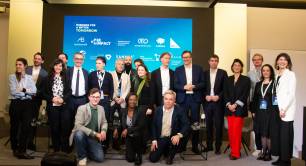The Editor’s Post: Can splintered progressives unite under a 'new economy’ movement?

In the aftermath of a Trump victory, champions of the “new economy” movement in Europe say despair is a luxury we can't afford. Taking action means learning from the success of the right wing – and even businesses can no longer shy away from getting political, say some.
When Donald Trump’s presidential election victory was confirmed, the stock market soared. So too did fears for the climate, women’s health and democracy.
It’s a gut-punch for those who’ve long been fighting these battles. As Lorenzo Fioramonti, a champion of the wellbeing economy, put it simply, “I’m tired. I’m tired of failing.”
Fioramonti was speaking in Brussels yesterday, at a conference hosted by Partners for a New Economy, where discussions were dominated by political shifts in both the US and many European countries.
Some argued that a Trump presidency doesn’t make that much difference. For Fioramonti, even a Kamala Harris win would have been a disaster, because “we have got used to accepting the lesser evil as a victory… so we lose from the get-go. We don’t even play the game.” Others, more optimistically, pointed out that those in the business of systems change aren’t fazed by what feels like shocks to the rest of us. “To systems thinkers and operators, this is not scary,” the tech-for-good founder Astrid J Scholz told me; rather, it’s about which part of the “Swiss army knife” we use next. And Jo Swinson, director of Partners for a New Economy (and the former leader of the UK Liberal Democrat party), said it was important “not to fall into the trap of despair”. Under the last Trump presidency, many US states and businesses stepped up regardless, she pointed out. “The ecological crisis will keep on coming. And so the case for action is going to be stronger than ever.”
The ecological crisis will keep on coming. And so the case for action is going to be stronger than ever
And there are opportunities. Movements to protect future generations are gaining support across the political spectrum; the EU is in the process of appointing a commissioner for ‘intergenerational fairness’. European city and regional governments remain ambitious yet realistic on climate action, according to Kirstin Dunlop of Climate-KIC, a climate innovation agency, who also highlighted opportunities in the 112 ‘Mission Cities’ that have committed to becoming climate-neutral by 2030. Even the prospect of a US withdrawal from the Paris Agreement might not be all bad, said economist Jayati Ghosh, since it may allow more productive discussions among the more committed parties. “We will now learn to swim around that big fish,” she said.
Perhaps the hardest part: learning from the success of our political rivals. “The right is very good at putting differences aside and coming together, for example through the lens of the culture wars, to say, ‘I hate them, you hate them. Let's do it all together’”, said Ayeisha Thomas Smith (pictured above) of the New Economy Organisers Network. Progressives, meanwhile, make the big mistake of ruling out potential allies just because they don’t agree on everything. The new economy, she proposed, could be their “umbrella”, the uniting idea that “helps us move forward”.
For many, neutrality is no longer an option. Environmentally destructive companies are vocal in politics, but green economy companies still shy away from this, said Fioramonti: they need to “get their hands dirty”. Astrid Scholz put it even more bluntly: impact investors are part of the problem, unless they “actually do the f*cking work… of actually, deeply interrogating the systems that they’ve been complicit in too”.
She added: “There’s not been a deep questioning of the way we invest, the mechanisms and structures through which we invest, what we ask of social entrepreneurs, the fact that people just think we can have the existing asset classes and do business as usual… without questioning if that even makes sense.”
Top stories this week:
Analysis: Is OpenAI impact washing by becoming a public benefit corporation?
VC investments in impact startups worldwide fall by more than a quarter in 2024
Expert Insight: How women are shaping the future of responsible AI
Top photo: Ayeisha Thomas Smith, speaking at the Partners for New Economy event in Brussels this week (credit: Martin Pilette for P4NE)
Thanks for reading our stories. As an entrepreneur or investor yourself, you'll know that producing quality work doesn't come free. We rely on our subscribers to sustain our journalism – so if you think it's worth having an independent, specialist media platform that covers social enterprise stories, please consider subscribing. You'll also be buying social: Pioneers Post is a social enterprise itself, reinvesting all our profits into helping you do good business, better.




